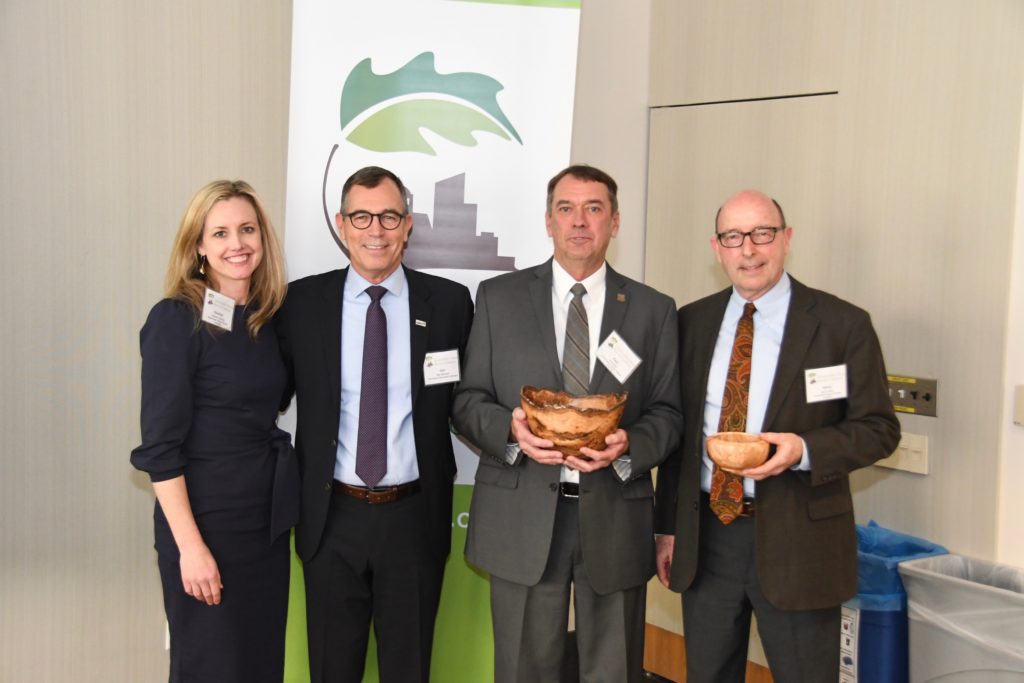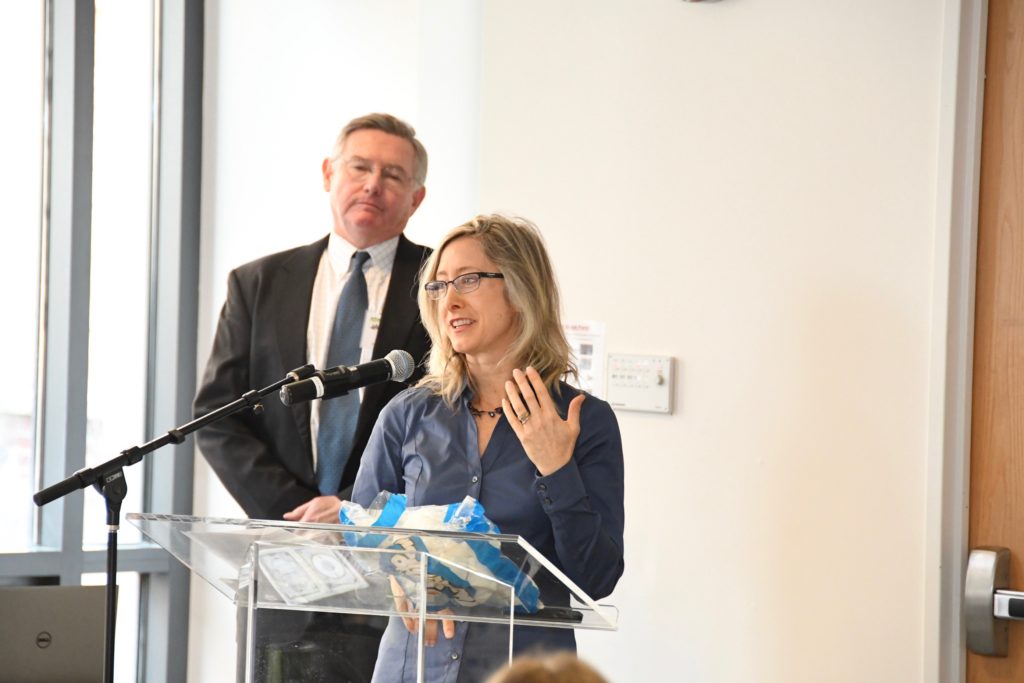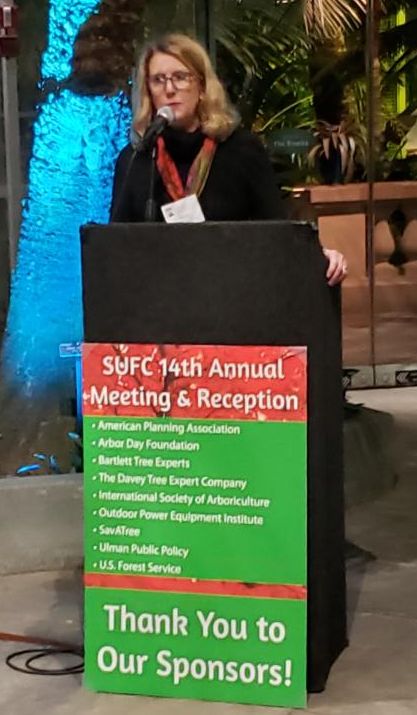March 2019 Note from the Chairs

past Co-Chair Don Winsett congratulate
Paul Ries and Gerry Gray
It was wonderful to see so many faces, both familiar and new, at our annual meeting and reception earlier this month. As always, we found the collaborative networking opportunities and stimulating policy, research and practice presentations invaluable. It was also a fitting send-off for our outgoing Co-Chairs Paul Ries and Gerry Gray, who have done so much for the Coalition over the past few years.
Annual Meeting Highlights
Outlook from the Incoming Co-Chairs As your new SUFC co-chairs we’ll be focused on our core goals of amplifying our collective voice to speak up for policy, programs and funding that support thriving communities through healthy urban and community forests.

Jennifer Judd Hinrichs
address the meeting participants
We also realize that as co-chairs we’re here to keep the ship moving forward, but it’s our members that are the true propellants. Our strength is in the collective breadth and depth of our members’ programs and networks.
This is particularly important at our working group level, and we want to recognize the hard work of our Policy, Research, and Strategic Engagement and Networking Working Groups co-chairs and members over the last year. In the coming months, we hope that some of you will consider the opportunity to enhance your SUFC involvement as both the Policy and Research working groups look to fill co-chair roles.
Meeting of the Minds The Annual Meeting featured a presentation by Gordon Feller, founder of Meeting of the Minds, which focuses on urban sustainability and works to bring together businesses, non-profits, associations, and governments to collaborate on a range of issues facing our cities. As Gordon noted, there is a wide array of great, “unlikely” partners that SUFC could connect with — it’s just that most don’t yet know they’re ready to be our partners. In the coming months, Gordon will be working with SUFC to engage some of these potential new allies, starting in Silicon Valley.

Vicki Christiansen makes remarks at the reception
Forest Service Perspectives Along with several of her USDA Forest Service colleagues, we were joined by Jan Davis, Assistant Director of Cooperative Forestry. Jan shared her thoughts on the Coalition and its unique role in urban and community forestry, highlighting three key opportunities for SUFC in 2019: engaging our network to encourage collaboration and to advocate for urban forestry, continuing our work around a diverse workforce and the economic impact of urban forestry, and embracing new members.
USFS Chief Keynotes Reception Our annual reception at the U.S. Botanic Garden was not only a chance to take in the beautiful surroundings and relax after our full day, but also afforded the opportunity to hear from USDA Forest Service Chief Vicki Christiansen, who shared her perspective on the value of SUFC and the wide base of support for urban and community forestry programs represented by our membership.
Collaboration Presentations and Updates
With two successful years of the SUFC Networking Initiative under our belt, we were thrilled to receive 17 submissions — the most ever — for this year, with the theme of “The Future of Urban Forestry.” We heard from four projects selected for this year’s cohort as well as updates from two of last year’s selected projects. The full presentations shared at our annual meeting are available here, and SUFC members interested in collaboration are encouraged to reach out to project leads for more information.
2019 Presentations
- Certification Partnerships to Support Urban Wood Utilization and Community Benefits: Led by Dovetail Partners and supported by the North Carolina Forest Service, Urban and Community Forestry Program, and the USDA Forest Service, this initiative is developing a unified urban wood certification strategy to align existing urban forestry programs, including accreditation, licensing, training, and certification.
- How to engage: SUFC members can participate in standards development working groups, assist in raising awareness with stakeholders, and encourage municipalities to participate in certification opportunities. Contact Kathryn Fernholz at Dovetail Partners.
- Encouraging Residential Tree Stewardship Behaviors: Led by the National Socio-Environmental Synthesis Center (SESYNC), this project will evaluate yard tree giveaway engagement strategies with the goal of learning what works to encourage proper tree care. Working with TreePhilly, this initiative will randomly assign participants who receive a tree in 2019 and 2020 to “business-as-usual tree care instructions or a behaviorally informed course of engagement designed to motivate stewardship actions.”
- How to engage: SUFC members can lead similar field trials to evaluate the effectiveness of various types of intervention on stewardship practices. Contact Dexter Locke at SESYNC.
- Rebuilding Communities Through an Urban Wood and Land Restoration Economy: Led by the USDA Forest Service, The Baltimore Wood Project is a pilot project to bring together stakeholders to reclaim wood, lives, and neighborhoods in urban and rural areas. Benefits include reducing landfill waste, restoring land, creating jobs, and driving sustainability.
- How to engage: SUFC members can advocate for urban wood re-use with the public and policymakers, educate architects and designers about the value of locally-sourced urban wood in their projects, and support funding for urban wood projects in additional communities. Contact Lauren Marshall at the USDA Forest Service.
- Urban Forestry Actions on Coastal Lake Michigan Industrial Lands: The Wildlife Habitat Council (WHC) is working with industrial landowners on the shores of Lake Michigan in Illinois and Indiana to implement urban forestry programs. Specifically, the “Urban-Forestry Actions for the Port of Indiana” project, as part of the USDA Forest Service Great Lakes Restoration Initiative, will plant more than 1,000 trees, clean stormwater runoff to Lake Michigan, and engage more than 30 companies and their employees, along with agencies, conservation groups, and communities, to plant native trees surrounding the Port.
- How to engage: SUFC members may be interested in additional partnership support and presence on tree planting days and other opportunities to work with the private sector to advance urban forestry. Contact Daniel Goldfarb at WHC.
2018 Updates
- City Forest Credits shared an update on its work to help fund urban forests by connecting private-sector investment with urban forest projects that can provide certified carbon credits plus other benefits from city trees. Projects are underway in places such as Austin, Texas, King County and Shoreline, Washington, and Des Moines, Iowa, with other possibilities in Minnesota, Washington, Oregon, and Pennsylvania.
- The Green Infrastructure Center shared lessons learned from its initiative to promote resilience and stormwater management via trees in 12 cities across six states in the South by mapping canopies and analyzing where additional trees could be planted. Next steps include releasing a book of case studies comparing all 12 municipalities, later this spring.
Sincerely,
Mark Garvin and Jennifer Judd Hinrichs
SUFC Co-Chairs